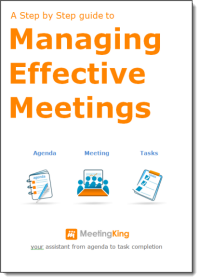Today The Wall Street Journal published a very interesting article on the amount of time a CEO spends in meetings. A team of scholars from London School of Economics and Harvard Business School, analyzed the day-to-day schedules of more than 500 CEOs from around the world to see how they organize their time—and how that affects the performance and management of their firms.
It turns out that CEO’s spend at least a third of their time in meetings. In one sample of 65 CEOs, executives spent roughly 18 hours of a 55-hour workweek in meetings, more than three hours on calls and five hours in business meals, on average. Some of the remaining time was spent traveling, in personal activity, such as exercise or lunches with spouses, or in short activities, such as quick calls, that weren’t recorded by CEOs’ assistants. Working alone averaged just six hours weekly.
The complete article can be found at: http://online.wsj.com/article/SB10001424052970204642604577215013504567548.html
My comment on the article.
The main job of a CEO is to move an organization or project forward – set the direction, define goals and make sure the goals are met. To accomplish this, the CEO, and other managers below the CEO, need to delegate, coordinate and communicate.
Meetings are a unique form of communication – they enable two way direct interaction between two or more people and create a mutual goal. Delegating work in a meeting will lead to better buy-in than just emailing an order, but more importantly the person or people the assignment is delegated to, often know much more on how to implement it, the possible problems and alternative solutions to accomplish the goal in a different more efficient way. This multi directional communication makes meetings so important and also explains why forceful dictator-like leaders are not successful in the long run.
Unfortunately many meetings are a waste of time, because of poor preparation and limited or no follow-up. When I was CEO of a medium sized software company I experienced this myself. Everyone is too busy with day-to-day activities and jumping from one meeting to the next that we lost track of what was decided and what actually needed to be done. The core problem was that the information and documentation related to meetings – agenda, minutes, tasks list, was either not done, done on individual pieces of paper, or recorded in a static Word document that was stored somewhere on the server. The result was that participants had a different recollection of what was decided and tasks were forgotten or not tracked.
To make meetings more effective and reduce the administrative overhead related to meetings, I developed MeetingKing.com. MeetingKing.com is a web based meeting facilitation and documentation tool that follows the natural workflow before, during and after a meeting. So instead of juggling information in multiple applications, like email, Word and task or project managers, everything is in one place.
I believe that with discipline and the right tools meetings, either in person or remote, are still the most powerful way of communication to move an organization or project forward.


